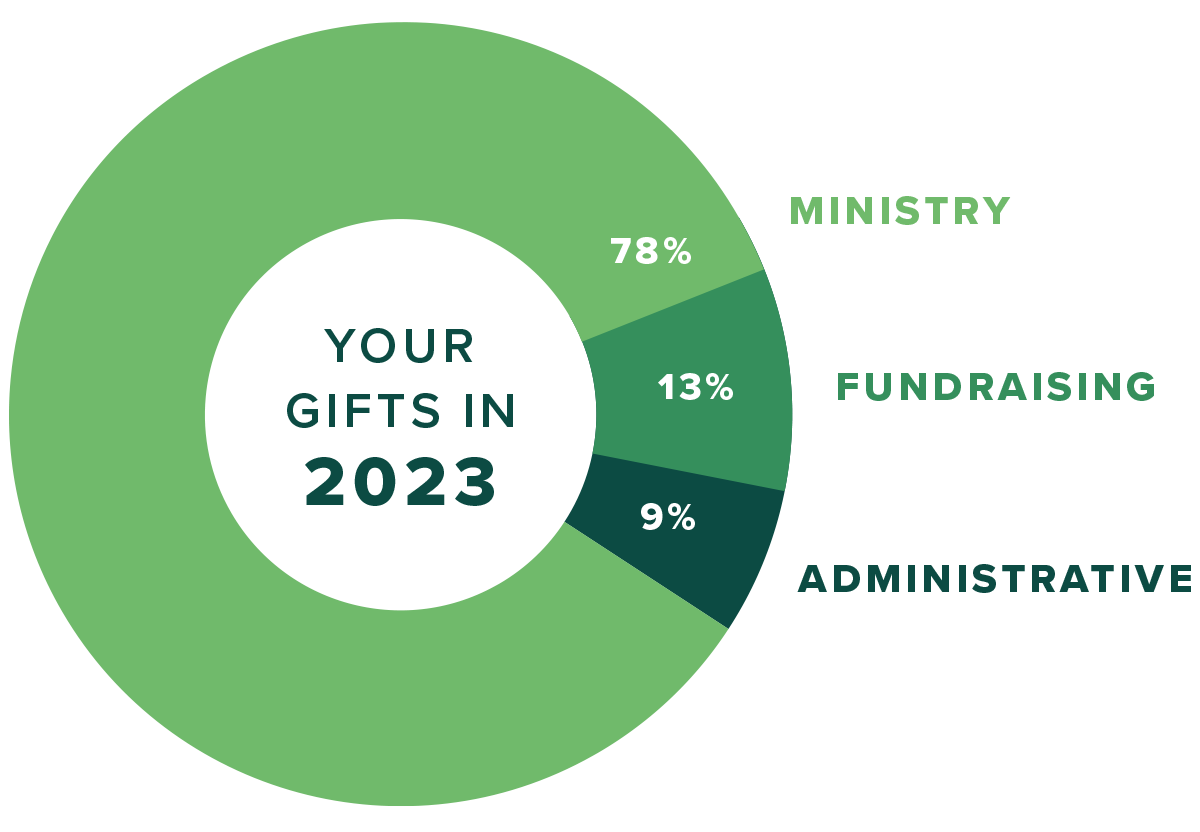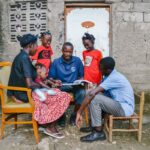Here’s a look at Christmas traditions in Kenya, and how Child Champions help kids in hard places celebrate Christmas when their families cannot afford to hold celebrations.
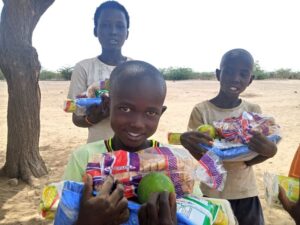
Kids at a Hope Center show off their Christmas presents, which often include food staples.
There is nothing quite like Christmas in Kenya, for both adults and children.
For adults, it’s a chance to relax and bond with their families.
For children, it is a time to make memories that will live with them for the rest of their lives.
Many city residents travel to rural areas to get away from their noisy and fast-paced life to visit extended family.
Christmas is an exciting time for school-age kids because the longest school holidays are in December. Schools close in November and kids stay home until January.
The long holiday means more playtime with friends and an opportunity to visit distant relatives.
In Kenya, there are two ways to prepare for Christmas. The first is when people prepare for Christmas a month in advance. The second way is then people wait until just days before Christmas to start preparations.
Most financially well-off people prefer to make advance preparations for Christmas. Families living in poverty, however, must settle for late preparations, if any at all, because most make less than the equivalent of $2 a day, which means early Christmas celebrations are a luxury they cannot afford.
Food at the Center of Celebrations
Traditional preparation involves purchasing food items like goats, cows, chicken, rice, and wheat flour that will be used to prepare various delicacies on Christmas Day. Parents also purchase new clothes and shoes for their kids, and many other kinds of presents, too, for their loved ones.
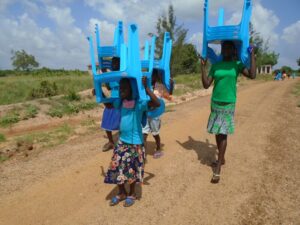
Kids carry plastic chairs to a Hope Center to prepare for Christmas celebrations.
Most parents get their children gifts they had promised them during the year.
For instance, a parent may have promised to reward their child if they excelled in school. Presents range from toys, teddy bears, school bags, bicycles, or a trip to new destinations in the country.
Most families in Kenya never set up Christmas trees because it is not the tradition.
However, some families in the cities have, in recent years, embraced the practice of setting up Christmas trees.
A week before Christmas, most Sunday school kids go to church to rehearse for the Christmas carols, skits, and poems that will be presented in church on Christmas Day.
It is a common tradition to have children perform in church on Christmas day, and they are awarded gifts by the church after their presentations.
On Christmas Eve, different kinds of foods are prepared. A flatbread called chapati is a popular food in Kenya and is always included on the Christmas menu. Chapati is not easy to afford for families in hard places because the numerous ingredients used to prepare it are expensive. Apart from chapatis, chicken, beef, lamb, and goat stews and barbeques are also prepared.
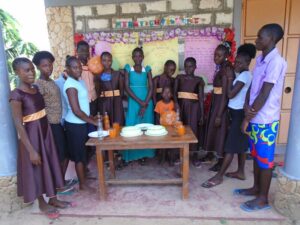
Cake is a welcome treat at the Christmas celebration.
Homes are also usually decorated with flowers, Christmas lights, and balloons. Churches, too, are decorated with flowers, hanging decorations, balloons, and beautiful candles.
On Christmas Day, people attend church services first.
Most churches in Kenya prefer having the Christmas church services early in the morning so that families can have the rest of the day to themselves and celebrate with their families.
Unfortunately, families living in hard places never get to enjoy these Christmas traditions simply because they cannot afford them.
With the little income they get from doing menial jobs like gardening, cleaning, and small-scale farming, caregivers must spend their money on basic needs like food and rent just to survive.
Kids in hard places rarely get to receive presents, let alone feast during Christmas. With most thinking about when they will get their next meal, they never get to know about Christmas carols, poems, or decorations during Christmas.
Hope Centers Make Wishes Come True
But impoverished children who attend any of the 27 Hope Centers across Kenya have a different Christmas experience – one filled with hope, joy, and excitement.
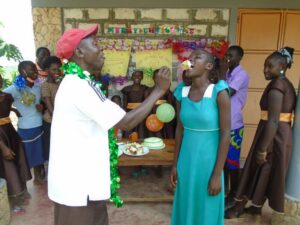
A Child Champion and a teen playfully feed each other cake.
Hope Centers have loving and caring Child Champions who take time to teach the kids and caregivers about Christmas.
Child Champions begin preparations for Christmas celebrations two months before Christmas, all to make a difference in the children’s lives.
Preparations begin by kids writing Christmas letters to their sponsors.
Before Hope Centers existed in Kenya, families never knew the impact that a letter could have on a child’s life.
But now, kids get to experience something new through writing and receiving letters.
Letters are written on beautiful cards that are special to each child. The children share beautiful messages with their sponsors.
Letters are an important part of ushering in the Christmas festivities around the Hope Centers and in the communities that the nonprofit OneChild serves.

Music and singing are often at the heart of Christmas celebrations.
Before Christmas Day, Child Champions meet with children’s caregivers to discuss what items they would like purchased as gifts for the kids and their families.
This ensures that their Christmas wishes are heard and granted.
Thanks to the Christmas Gift Fund, funded by generous sponsors and donors, the Hope Centers spend an entire month purchasing Christmas gifts for the kids.
The gifts range from clothes, uniforms, shoes, school bags, school stationery, beds, mattresses, beddings, and food.
For the clothes and shoes, Child Champions take measurements of each child before making the purchases.
No Children Are Left Out
In addition to Christmas gifts donated by the sponsors to the kids and their families, Child Champions go the extra mile to urge parents to help organize a Christmas party at each center. Each caregiver contributes money toward throwing a big party for the kids. The Hope Center also purchases a cow or some goats that are slaughtered and prepared for all kids and parents during the celebrations.
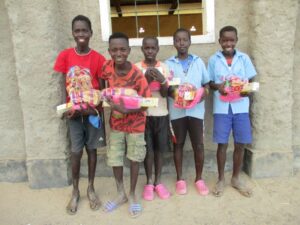
These young men show the gifts they received.
Once all the gifts and food have been purchased, Child Champions help the kids rehearse their Christmas carols, skits, and poems, which are presented to the parents and the church on Christmas Day.
On Christmas Eve, Hope Centers are beehives of activity.
The church is decorated, children rehearse their various presentations, food is prepared in advance, and Hope Centers are cleaned.
Parents volunteer to help prepare the enormous amount of food.
Meanwhile, Child Champions are busy wrapping kids’ gifts and labeling them.
On Christmas Day, kids come into the Hope Center earlier than their parents so that they can settle in for their breakfast before the day’s events kick off. The kids are usually urged to bring their friends who are not registered in the OneChild program so that the joy of Christmas is shared with the entire community.
Christmas songs are sung, and the church leads the parents in praying for the kids. The kids then get to make their presentations which are followed by a lot of clapping and joy. They then proceed to share a feast at the center.
The feast includes chapati, pilau (a Swahili spiced rice), beef, chicken, stews, and grilled goat meat.
The children are then given their Christmas gifts. With memories made and spirits lifted, the children and parents go home happy.
Your donation to the Christmas Gift Fund ensures that every child in our care gets to experience the joy of Christmas.
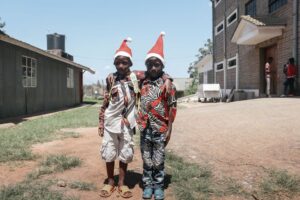
Merry Christmas from Kenya!
We are accountable to the children we serve AND to our donors.
Our accountability to our donors is one of our highest priorities. Our goal is to use the funds entrusted to us as wise stewards. To do this requires continued monitoring of our fund distribution. OneChild is also a member in good standing with the Evangelical Council for Financial Accountability (ECFA)
